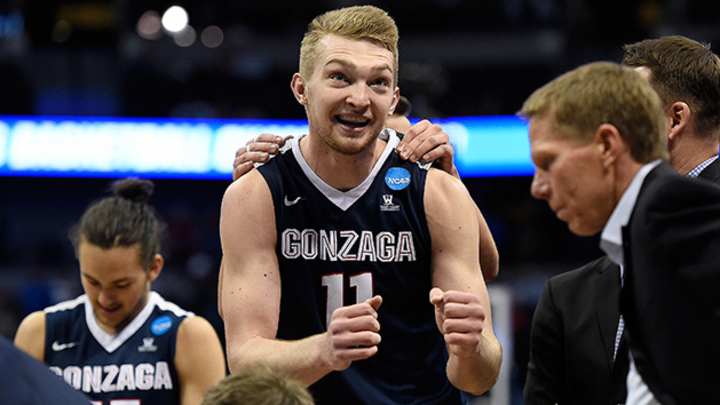2016 NCAA tournament Sweet 16 preview: Gonzaga Bulldogs

As part of its preview of the Sweet 16, SI.com is taking a look at each of the teams remaining in the NCAA tournament. Adjusted offense and defense statistics—which measure the number of points scored and allowed per 100 possessions—are from kenpom.com and the rankings are relative to the other teams still alive. All other advanced stats are also from kenpom.com (unless noted otherwise) and are through March 21.
Record: 26–7 (15–3 WCC)
Adjusted offensive/defensive efficiency: 114.5 (24th)/97.8 (55th)
Path to the Sweet 16: Beat No. 6 Seton Hall, 68–52; Beat No. 3 Utah, 82–59
Impact Player: Domantas Sabonis, sophomore forward, 20.0 ppg, 13.0 rpg, 1.5 bpg through two NCAA tournament games
• MORE: Seth Davis reviews opening weekend & previews the Sweet 16
The Case For: Forget the fact that Sabonis is the best big man left in the NCAA tournament, a tough, physical post presence who finishes inside and plays with a tremendous motor. Set aside the fact that his frontcourt mate, senior forward Kyle Wiltjer, leads the team in points (20.4) and three-point field goal percentage (42.3). The Zags’ best argument for advancing in the tourney right now is Eric McClellan, a 6'4" guard.
The redshirt senior has had a journeyman career, starting at Tulsa, detouring through Vanderbilt and ultimately landing at Gonzaga, where he was named the 2015–16 WCC defensive player of the year. After averaging less than 10 points a game during the regular season, McClellan has almost doubled his production in the postseason, scoring 18.4 ppg dating back to the WCC quarterfinals. In a season punctuated by a stellar inside game but shaky perimeter play, McClellan has grown more than any other Gonzaga guard. And he’s peaking at the right time, shooting 80% from the field (12 of 15), including 66.7% from three in the tournament. Why think he’ll slow down?
The Case Against: Gonzaga can and should beat Syracuse, a No. 10 seed that benefited from Middle Tennessee's stunning first-round upset of tourney favorite Michigan State. But what happens when the Bulldogs run into top seeded Virginia, one of the most efficient offensive and defensive teams in the country, and the second-best scoring defense in the country (just 59.5 points per game)? What about fourth-seeded Iowa State, which shoots 50.3% from the field, third-best in college hoops?
Gonzaga makes its living on the offensive end of the floor, not the defensive end, where Wiltjer and his slow feet are a major liability. Also, what do we really know about Gonzaga after two tournament wins? Seton Hall forced the Zags into 20 turnovers—there’s that shaky guard play again—and Utah came stumbling into the tournament. One knock against the Bulldogs during the regular season was a lack of signature wins; there’s an argument to be made they still don’t have any. And what happens if Sabonis or Wiltjer gets in foul trouble, or can’t finish at the rim? Gonzaga has virtually no bench—six players average more than 21 minutes a game. Take Sabonis and Wiltjer out of it, and pressure the guards into throwaways, and the Zags will wilt like an 11 seed is supposed to.
SI Prediction: Beat No. 10 Syracuse in the Sweet 16; lose to No. 1 Virginia in the Elite Eight

Staff writer Lindsay Schnell joined SI in 2014 as a national college sports writer after covering Oregon State athletics for The Oregonian.